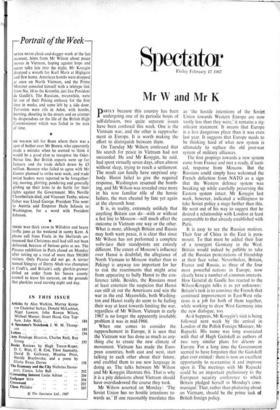Mr W and Mr K
pARTLY because this country has been undergoing one of its periodic bouts of self-delusion, two quite separate issues have been confused this week. One is the Vietnam war, and the other is rapproche- ment in Europe. It is worth making the effort to distinguish between them.
On Tuesday Mr Wilson confessed that his search for peace in Vietnam had not succeeded. He and Mr Kosygin, he said, had spent virtually seven days, often almost without sleep, trying to reach a settlement. The result can hardly have surprised any- body. Hanoi failed to give the required response, Washington resumed the bomb- ing, and Mr Wilson was revealed once more in his now familiar role of the heroic failure, the man cheated by fate yet again at the eleventh hour.
It is, in reality, extremely unlikely that anything Britain can do—with or without a hot line to Moscow—will much affect the outcome in Vietnam one way or the other. What is more, although Britain and Russia may both wAnt peace, it is clear that since Mr Wilson has not performed a complete voile-face their standpoints are entirely different. The extent of Moscow's influence over Hanoi is doubtful; the allegiance of North Vietnam to Moscow (rather than to Peking) is anyway too important for her to risk the resentments that might arise from appearing to bully Hanoi to the con- ference table. Besides, the Russians must at least entertain the suspicion that Hanoi can still sit out the Americans and win the war in the end. Meanwhile, both Washing- ton and Hanoi really do seem to be feeling their way at least towards limiting the war, regardless of Mr Wilson. Vietnam in early 1967 is no longer the apparently insoluble problem it was in mid-1966.
When one comes to consider the rapprochement in Europe, it is seen that the Vietnam war has done as much as any- thing else to create the new climate of movement. Vietnam has made the Euro- pean countries, both east and west, start talking to each other about their future, and enabled them to use new language in doing so. The talks between Mr Wilson and Mr Kosygin illustrate this. That is why it is a pity delusions about Vietnam should have overshadowed the course they took.
Mr Wilson asserted on Monday : 'The Soviet Union has no hostile intentions to- wards us.' If one reasonably translates this as 'the hostile intentions of the Soviet Union towards Western Europe are now vastly less than they were,' it remains a sig- nificant statement. It means that Europe is a less dangerous place than it was even last year. It suggests that Europe needs to be thinking hard of what new system is ultimately to replace the old post-war system of military alliances.
The first gropings towards a new system came from France and met a ready, if tacti- cal, response from Moscow. But the Russians could simply have welcomed the French defection from NATO as a sign that the Western defence system was breaking up while carefully preserving the Eastern system intact. Mr Kosygin last week, however, indicated a willingness to take Soviet policy a stage further than this. He went out of his way to suggest that he desired a relationship with London at least comparable to that already established with Paris.
It is easy to see the Russian motives. Their fear of China in the East is para- mount. To that must be added their fear of a resurgent Germany in the West. Britain would indeed be gullible to take all the Russian protestations of friendship at their face value. Nevertheless, Britain, France and Russia, as three of the four most powerful nations in Europe, now clearly have a number of common interests. How General de Gaulle has reacted to the Wilson-Kosygin talks is as yet unknown : Britain's task is to convince the French that continued improvement in East-West rela- tions is a job for both of them together, while working to draw West Germany into the new dialogue, too.
As it happens, Mr Kosygin's visit is being followed next week by the arrival in London of the Polish Foreign Minister, Mr Rapacki. His name was long associated with that of Hugh Gaitskell as authors of two very similar plans for détente in Europe. For a long time the Government seemed to have forgotten that the Gaitskell plan ever existed : there is now an excellent opportunity to re-examine it and improve upon it. The meetings with Mr Rapacki could be an important preliminary to the European security conference to which Britain pledged herself in Monday's com- muniqué. That, rather than ploitering about on Vietnam, should be the prime task of British foreign policy.





























 Previous page
Previous page